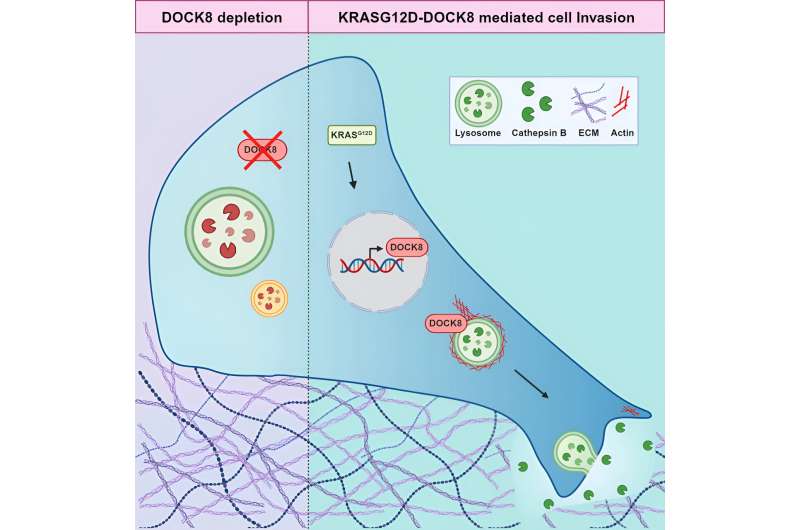This article has been reviewed according to Science X's editorial process and policies. Editors have highlighted the following attributes while ensuring the content's credibility:
fact-checked
peer-reviewed publication
trusted source
proofread
Researchers make unexpected discovery in how pancreatic cancer spreads

How cancer spreads or metastasizes is a big question for cancer researchers and patients. Mayo Clinic researchers studying pancreatic cancer—the third deadliest form of cancer in the U.S.—recently made a discovery that advances knowledge of how metastasis unfolds. They identified a cell-signaling protein that drives pancreatic cancer cell growth that could be a potential therapeutic target.
"Our ultimate goal is to find the triggers for metastasis and stop it. Combine that with treatments to reduce tumor growth, and we can hopefully improve patient outcomes," says Gina Razidlo, Ph.D., the senior author of a paper published in Cell Reports.
Looking inside the tumor microenvironment
Tumors grow in nutrient-poor environments, so cancer cells must rewire cellular metabolism to meet their energy needs. One way in which cancer cells hijack metabolic pathways is through lysosomes, which function as the cell's stomach and are filled with digestive enzymes. Lysosomes break down proteins, lipids and nutrients that fuel cells to grow. Previous research has shown that amplified lysosome activity is a hallmark of various forms of cancer.
This knowledge led Dr. Razidlo and lead author Omar Gutierrez Ruiz, Ph.D., to look closely at the characteristics of lysosomes in pancreatic cancer cells driven by mutations in the cancer-producing mutated gene, or oncogene, KRAS. Dr. Gutierrez Ruiz collaborated with the Mayo Clinic Proteomics Core on this project as part of his dissertation, and together, they made an unexpected discovery.
They compared the lysosomes from pancreatic cancer cells expressing oncogenic KRAS with lysosomes from cells with healthy KRAS to find out what was different. Among the 52 proteins they found that had changed on the surface of lysosomes in pancreatic cancer cells, one protein called dedicator of cytokinesis 8 (DOCK8) stood out.
DOCK8 creates invasive protrusions that act like little arms that can worm through and change the structure of a cell and degrade its surroundings. DOCK8 is typically found in healthy immune cells where it helps the cells navigate and squeeze through dense tissue, aiding the response to and fight against infection. Surprisingly, Dr. Razidlo, Dr. Gutierrez Ruiz and their collaborators found DOCK8 on lysosomes in pancreatic cancer cells.
How does DOCK8 work?
How cancer cells invade and spread resembles how DOCK8 helps immune cells penetrate tissue. The researchers looked at images and videos of the pancreatic cancer cells, produced in Mayo Clinic's Center for Cell Signaling in Gastroenterology. They saw DOCK8 using lysosomes to break down the extracellular environment around the cancer cell—helping it spread.
To confirm that this protein is involved in tumor progression, the team eliminated DOCK8 in pancreatic cancer cells using the gene-editing tool CRISPR. They found in a preclinical model that the DOCK8-depleted lysosomes moved slower, tumor growth slowed and metastasis decreased. Then, they delved further and showed that DOCK8 was present in about 20% of patients with pancreatic cancer whose cells were studied.
"Now that we have found out that DOCK8 is regulating the process of metastasis, it could potentially be a therapeutic target to prevent or stop pancreatic cancer metastasis," says Dr. Gutierrez Ruiz, who graduated from Mayo Clinic Graduate School of Biomedical Sciences in May.
More information: Omar L. Gutierrez-Ruiz et al, Ectopic expression of DOCK8 regulates lysosome-mediated pancreatic tumor cell invasion, Cell Reports (2023). DOI: 10.1016/j.celrep.2023.113042


















